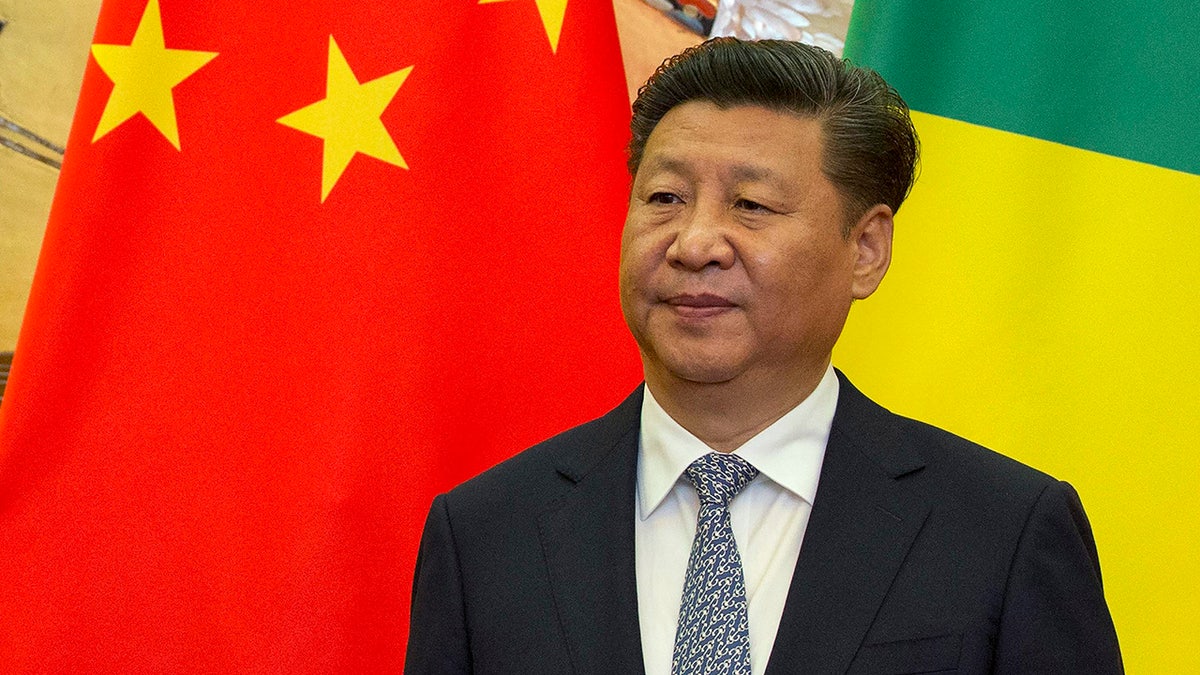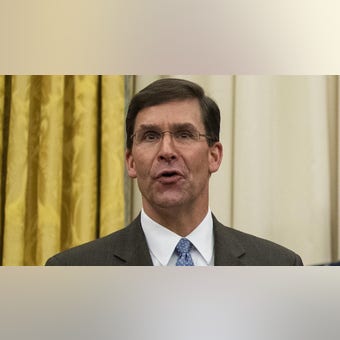Former Secretary of Defense says China is the 'greatest strategic challenge' facing America
Mark Esper discusses relations between the United States and China, and how to prevent China from attacking Taiwan.
A year ago, most people would have viewed a major land war in Europe as inconceivable. Yet months after Russia launched a brutal invasion of Ukraine that has seen thousands of civilians killed and cities destroyed, many in the West are asking how this tragedy could have been prevented. The answer is clear: military capability, committed allies, credible policy, and resolve.
Taiwan faces a similar situation today with Communist China, an aggressive neighbor 60 times its size. Most probably cannot find Taiwan on a blank map, but it’s an advanced economy and robust democracy that has lived in the dark shadow of Beijing’s threats for decades. Preserving this democracy has long been a U.S. priority. Today, this island nation, which is slightly larger than Maryland, sits uneasily on the frontline of an escalating contest between autocracy and democracy for control of the 21st century.
Having recently visited with Taiwan’s leadership, I found both resolve and apprehension about the future. Most believe Chinese General Secretary Xi Jinping will secure an unprecedented third term in the fall. This will both bolster his power and ensure his place in Chinese history alongside another authoritarian, Mao Zedong. Xi, however, aims to accomplish what his predecessors could not – mainland control of Taiwan.
Since taking China’s helm in 2013, Xi’s iron grip has rolled back what limited freedoms his 1.4 billion people once enjoyed. In Hong Kong, he broke his pledge to respect that once-free city-state’s status with the false promise of "One Country, Two Systems."
Meanwhile, Beijing’s bellicose foreign policy has been marked by debt diplomacy, coercion, and self-declared "wolf warrior" diplomats. Its military buildup has resulted in China now possessing the world’s largest Army and Navy, a modern air force, and a growing nuclear capability. Xi’s aim is to build an economy and a military by 2049 able to challenge America’s global leadership so that the Communist Party can rewrite international rules and norms.
It is now time to clearly state that the United State will come to Taiwan’s defense.
At the dawn of modern U.S.-China relations in 1972, Washington supported a "One China" policy, acknowledging Beijing’s view that Taiwan is part of China, but neither endorsing nor agreeing with this position. This allowed the U.S. to thread a needle between geo-political principle and pragmatism; it was successful in pulling China to our side during the Cold War.

FILE - Chinese President Xi Jinping stands in front of national flags of China and Republic of Congo during a meeting with visting Congolese dignitaries at the Great Hall of the People in Beijing, China, Tuesday, July 5, 2016. (AP Photo/Ng Han Guan, Pool, File)
Despite Beijing’s best efforts through the decades to promote their interpretation of this policy, the U.S. has never recognized mainland sovereignty over Taiwan, and has long worked to help the people of Taiwan achieve the level of democracy they now enjoy.
DEFIANT TAIWANESE READY IF CHINA INVADES, SAY THERE'S ONLY ONE POSSIBLE RESPONSE
Today, this policy has been overcome by history. A majority in Taiwan no longer consider themselves Chinese, the country long ago renounced any territorial claim to the mainland, and Beijing has consistently violated a fundamental tenet against using coercion to change the status quo.
In fact, the Taiwan Relations Act that has governed U.S. policy on these matters since 1979 not only ensures that Washington will provide Taiwan the means to defend itself, it further states that the U.S. will "consider any effort to determine the future of Taiwan by other than peaceful means…a threat to the peace and security of the Western Pacific area and of grave concern to the United States." Today, this region of the world is an ever-greater vital interest worth fighting for.
But between the lack of explicit language promising U.S. military support for Taiwan, and a concern at the time that Taipei might do something that drew us into an unnecessary conflict with China, "strategic ambiguity" regarding the extent of our support for Taiwan became U.S. policy.
Taipei’s prudence through the years of avoiding provocation (and reasoning that Washington might not feel obliged to get into a fight that Taipei started), coupled with Beijing’s increasing aggressiveness toward Taiwan, has recently revealed the inadequacy of our ambiguity.
With concern growing in Western capitals that China may finally turn its threats into real action – an outright invasion, a blockade, missile barrages, cyber attacks, or some form of "gray zone" action – to compel Taipei’s capitulation, it is now time to clearly state that we will come to Taiwan’s defense. President Joe Biden has now said so three times, but White House staff walking back this commitment each time have made things even less certain.
To clarify our policy, the president should initiate a dialogue with Congress. Both branches must be aligned as we move forward. This process will also have the salutary effect of educating the American people of the threats we face from China. After all, we need a new policy that is not just credible and principled, but also durable and sturdy enough to bear the weight of the future strategies we will pursue and decisions we may make to keep the peace and help our friends.
US DEFENDS SENDING AIRCRAFT THROUGH TAIWAN STRAIT AS CHINA GROWS INCREASINGLY AGGRESSIVE
Meanwhile, Taiwan can enable this dialogue -- and inspire other democracies to do the same --by taking several decisions that will signal Taipei’s sense of urgency and commitment to reform.
First, it must make significant increases in its defense spending, at least matching U.S. levels of 3.1% of GDP.
Second, it must fully implement an asymmetric strategy for its defense and procure the capabilities needed to make it effective.
Third, it must bolster its armed services and build territorial defenses by extending its conscription from the current four-month stint to at least one year, while also making the training more rigorous.
CLICK HERE TO GET THE OPINION NEWSLETTER
Fourth, reserve mobilization must be revitalized through actions such as frequent exercises.
And finally, Taiwan must stockpile the energy supplies, foodstuffs, weapons, ammunition, and other materials necessary to holdout for weeks at a time against a Chinese blockade or attack, while also building resilience into key infrastructure such as telecommunications systems.
These actions will show the world that the Taiwanese people understand that their security begins with them, giving Western capitals confidence to stand behind a democracy that shares their values.
CLICK HERE TO GET THE FOX NEWS APP
Taiwan cannot beat China in a head-to-head conflict. But Taipei can make Xi Jinping think twice before he attacks a nation under arms – 23 million freedom-loving people who are armed, trained, and committed to their sovereignty and survival – who also have the backing of other democracies also prepared to respond to unwarranted aggression, like they did toward Russia.
If Vladimir Putin had known this about Ukraine before unjustly invading his southern neighbor, he might never have done so in the first place, and the horrors occurring in Eastern Europe could have been prevented.
















































